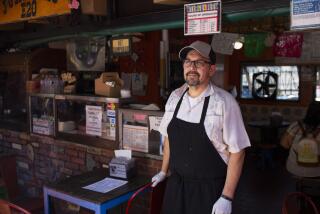Loan Keeps Food on Table
- Share via
Pietro Vitale slammed his gnarled 84-year-old fist on a table.
“The last two, three years have been tough,” said Vitale, owner of Oh Boy, a San Fernando frozen food plant that has employed thousands of people and made millions of pizzas over the last 48 years. “But you never give up! You have to endure.”
Last year, Oh Boy was in serious trouble. High-interest loans and exorbitant energy bills were about to force the closure of the landmark food corporation, which has 150 employees. But Vitale, the company’s colorful Naples-born owner, wasn’t ready to lock up his 1st Street plant without a fight. Filing for bankruptcy, he decided, was out of the question.
Still, Vitale was desperate. Not so much for himself--he lives in upscale Brentwood with his wife Concetta--but for his employees.
“I’ve enjoyed them for 50 years and I supported them with jobs,” he said.
So he turned to local government officials for help. Ultimately, it came in the form of a $3-million loan announced Friday by the Los Angeles County Float Loan Program, which lends money to cities that then pass it on to local businesses.
For Vitale and others celebrating the company’s survival and its continuing role as a community institution, the overwhelming sentiment was that it would not have happened without a team effort. They recalled the stress and strain of the last year.
The week before Thanksgiving 2001, San Fernando City Administrator Jose Pulido took a call from Vitale, who was fearful he would have to close by the end of the year. Pulido, who had been on the job only two months, contacted the Valley Economic Development Center, a nonprofit business development corporation based in Van Nuys.
Roberto Barragan, president of the corporation, checked out Oh Boy and found the company was burdened with high-interest loans. One account was calling for an immediate payment of $240,000, which Barragan’s group lent to Vitale. Another $2.4 million in loans owed by Oh Boy was refinanced Friday by the Float Loan Program.
The new loan has a 6.75% interest rate, down from Vitale’s previous 12%, which will save thousands of dollars.
Last year the company had $17 million in gross sales. “We almost broke even” Vitale said, adding that his goal is to get to $20 million this year and continue to grow.
During a tour of his plant, Vitale showed off the meatball room, the pasta room and the room where the company makes chicken pot pies for the Claim Jumper restaurant chain.
On the main assembly line, 45 workers prepared packaged dinners of chicken and rice in cream sauce. There was little noise other than the rumble of conveyor belts.
Cuta Agugnana, who was spreading sliced mushrooms over a chicken, smiled when she saw Vitale. “My boss will do anything for me,” said Agugnana, who has been working at Oh Boy for 44 years. “He’s the best.”
Wearing a white smock, a crisp blue shirt and snazzy yellow tie, Vitale greeted his workers by name, tenderly patting some of them on the cheek. Sometimes he called them “sweetie.”
Vitale came to America in 1948 to try his luck at importing and exporting Italian food products. After a few frustrating years, he decided to produce a line of frozen Italian foods.
Claiming his secret to success is “a little scotch, a little vino,” Vitale said he got the name for his company from American soldiers in Italy, who said, “Oh boy!” when they saw something they liked.
For nearly half a century, he has driven to the San Fernando plant six days a week. His sons, John and Peter, help him run the business.
Both Pulido and Barragan praised Vitale as a pillar of the community.
“He’s an incredible gentleman full of life who believed in his employees,” said Barragan. “When we talk about saving jobs, it’s often very cliche. But in this case, we really did save jobs. If we didn’t do this, 150 people, most of them Latino, most of them from San Fernando, would be unemployed.”
More to Read
Inside the business of entertainment
The Wide Shot brings you news, analysis and insights on everything from streaming wars to production — and what it all means for the future.
You may occasionally receive promotional content from the Los Angeles Times.










